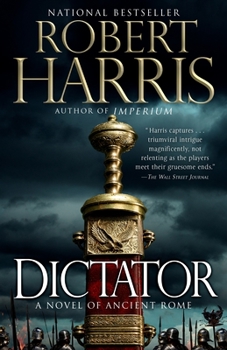Book Overview
The long-awaited final volume of the Cicero Trilogy, from a beloved bestselling author "incapable of writing an unenjoyable book" ( The Wall Street Journal ). At the age of forty-eight, Cicero--the greatest orator of his time--is in exile, his power sacrificed on the altar of his principles. The only way to return to Rome is to pledge his support to a charismatic and dangerous enemy: Julius Caesar. Harnessing his political cunning, unrivalled intellect, and the sheer brilliance of his words, Cicero fights his way back to prominence. Yet no public figure is completely safeguarded against the unscrupulous ambition of others. Riveting and tumultuous, Dictator encompasses the most epic events in ancient history, including the collapse of the Roman Republic, the murder of Pompey, and the assassination of Caesar. But its central question is a timeless one: how to keep political freedom unsullied by personal gain, vested interests, and the corrosive effects of ceaseless foreign wars. In Robert Harris's indelible portrait, Cicero is a deeply fascinating hero for his own time and for ours.
Format:Paperback
Language:English
ISBN:0307948137
ISBN13:9780307948137
Release Date:August 2016
Publisher:Vintage
Length:416 Pages
Weight:0.70 lbs.
Dimensions:1.0" x 5.2" x 8.0"
Customer Reviews
1 rating
This is one not to be missed!
Published by Doris M Katz , 3 years ago
Thanks to the clever use of Cicero's secretary, Tiro, as narrator of the tumultuous period of the first and second triumvirate in the late Roman Republic, I was able to follow one disaster after another. Cicero found himself in political conflict again trying to maintain equilibrium between opposing groups. It is disturbing to note that all of the principals involved in the upheaval perished: Caesar, Pompey, Crassus were executed or assassinated. Mark Antony and Cleopatra committed suicide as did Brutus - Cato's suicide was a statement in itself; his suicide was a symbolic sacrifice to the Republic.
One may wonder at all the bloodletting and brutality as evidenced by the slaughter of armies, civilian populations and prisoners of war. Was it excessive testosterone or a society captivated by the power of the gods they worshipped? Caesar seized that power in declaring himself a god. Octavian, Julius Caesar's adopted son, or Augustus as he became known, allied himself with differing opponents and was actually the last man left standing. One of his first acts was to eliminate all of his adversaries through execution and confiscating of their properties in order to finance his emerging dictatorship
Unfortunately, Cicero and his brother and nephew were among thousands who were pursued and executed. Cicero tried to preserve the republic by trying to fill power vacuums as they occurred, but lacked understanding of plebeian politics and was continually betrayed by supposed allies. Fortunately, Cicero is remembered for his profound influence on civilization through his writings on philosophy, the Latin language, Law, oration and rhetoric.





